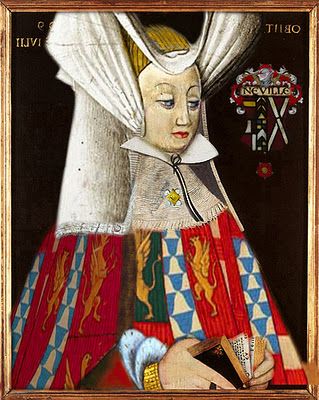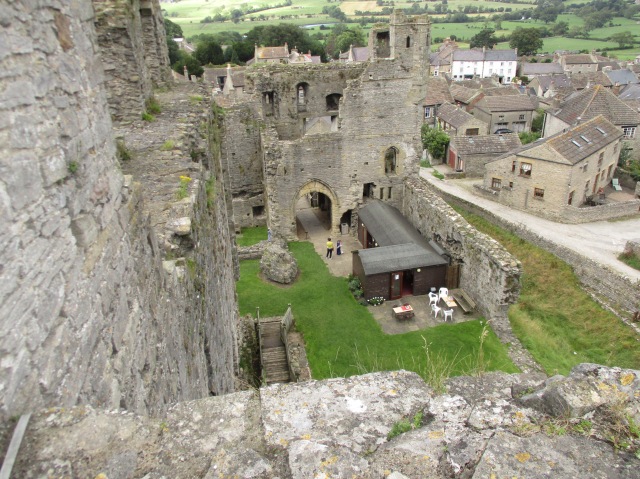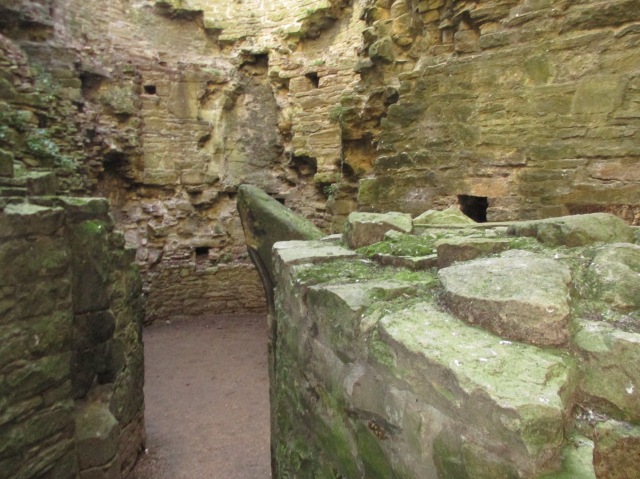On this day, 16th March in 1485, Anne Neville, Richard III’s queen, died at Westminster Palace, most likely from Tuberculosis. The couple had been friends since childhood, and Richard is said to have wept bitterly at her funeral. But the timing of Anne’s death, according to medieval beliefs, was eerily prophetic.

Anne Neville, the Kingmaker’s daughter and the last medieval Queen of England
Born on 11th June 1456, Anne was the younger daughter of the most powerful baron in the land, the ‘Kingmaker’ Earl of Warwick, Richard Neville (1428-71). She spent most of her childhood with her elder sister Isabel at Middleham Castle in North Yorkshire, and it was there that she met and befriended Richard while he was training for knighthood. When Lord Warwick switched allegiance from the Yorkist King Edward IV, Richard’s elder brother, to the Lancastrian cause, he arranged Anne’s marriage to the only son of the toppled mentally ill king Henry VI and Queen Margaret of Anjou to seal the alliance. Anne had no choice but to go through with it, but her marriage to Edward of Lancaster was only brief, as was Warwick’s restoration of Henry to the throne, and both Anne’s husband and father were killed in battles with the Yorkists in 1471.

Middleham Castle, where Anne grew up and got to know her future husband, Richard Duke of Gloucester, later Richard III
With Anne once again a free agent, Richard wanted to marry her, but his brother George, Duke of Clarence, Isabel’s husband, opposed the match. He and Isabel had given Anne shelter after Edward of Lancaster was killed, and George tried to keep her hidden so he could have both heiresses’ estates and fortunes for himself. There’s even a story that he hid Anne away in a London mansion disguised as a kitchen maid. However, she managed to slip George’s shackles, and after some debate before the king and then parliament, permission was finally granted for the pair to marry, and Warwick’s estates were to be divided between the two brothers.
Anne and Richard married, probably early in 1473, and they were crowned together at a magnificent ceremony in 1483 after parliament declared Edward IV’s heirs illegitimate. They only had one child, a son called Edward, but the young prince died suddenly in 1484 after a short illness, leaving his parents devastated. Later that year Anne’s health began to deteriorate, and in less than 12 months she followed her son to the grave.

The haunting remains of the entrance to the Princes Tower at Middleham Castle, where it’s believed that Anne and Richard’s son, Edward, was born
As Anne lay dying on 16th March 1485, there was a full solar eclipse. The sky darkened, the birds roosted and all went quiet. In these superstitious medieval times, celestial events were seen as divine omens and portents, causing fear and uncertainty. The Saxons linked them to attacks by the Vikings, and the Anglo Saxon chronicle notes that in the year 879: “A band of invaders gathered and established a base at Fulham; and in the same year the sun was eclipsed for one hour of the day.” Many believed that an eclipse signalled the fall of a king. One 12th Century chronicler, John of Worcester wrote: “in 1133 a darkness appeared in the sky throughout England. Some said that this was an eclipse of the sun… King Henry left England for Normandy, never to return alive.” Perhaps there was something in it back then after all, because just five months after Anne’s death, Richard was killed at the Battle of Bosworth and the Plantagenet dynasty that had ruled England for over 300 years died with him. The great era of the Middle Ages had breathed its last, and a new chapter of history was born.
So this evening I shall raise a glass to Anne Neville, and all my medieval heroes whose lives, loves and deaths played out far back in the shrouded mists of this most enticing and compelling of times.
A great post as always, and very interesting. I’ll raise a glass with you!
LikeLiked by 1 person
I can never get to grips with family trees, especially when families intertwine, so you deserve another drink just for that alone. Middleham is another castle that has passed me by so thanks for adding another one to my list
LikeLiked by 2 people
Thanks Malc. Yes the family tree of the Plantagenets is a tangled one. Middleham is a fab castle to explore, with masses of history, and it was RIII’s power base in the north. Glad to have helped to grow your list! Thanks for reading.
LikeLike
What a journey. So happy they finally got to be together. Although, that is a sad end. I will raise a glass with you as well!
LikeLiked by 2 people
A sad end indeed, but as you rightly say, at least they did get to be together eventually. And I’m so glad you’ll join me in a toast to Anne – and Richard. Cheers! And thanks for reading. 🙂
LikeLiked by 1 person
history was never this interesting at school, wish I had a teacher like you back then!
LikeLiked by 2 people
Thank you for such a lovely compliment! History was dealt with pretty boringly when I was at school too, so I was left to discover it later. But better late than never I suppose. Thanks for reading.
LikeLike
I’m glad she got her guy in the end!
LikeLike
Absolutely – me too! Thanks for reading, Carol.
LikeLike
First, a double like for Anne Lloyd’s comment! So true! I literally got chill bumps when I read your lines about Anne laying on her death bed during a solar eclipse and the quieting of the birds. They follow right after your photo of the very haunting Princes Tower entrance. Brilliant! Anne’s story – and certainly your telling – is almost unbelievably engaging. We’re looking for something to watch on Netflix right now and I know there won’t be anything to compare! I think maybe the Middle Ages could only have ended with such drama. Great!
LikeLiked by 1 person
Thanks for these very kind comments Lindsay, it means a great deal to me, especially that you found Anne’s story and her end so engaging. The Middle Ages are full of great stories like this, which is one of the main reasons I love them so much. I don’t know whether you’d get this on Netflix, but there was a drama series on a few years ago over here called ‘The White Queen’ and it was all about the Wars of the Roses from three women’s points of view, and how their stories intertwined. Although it mainly focuses on Elizabeth Woodville, Edward IV’s queen and mother of the princes in the tower, Anne is one of the other two. It goes right up to the Battle of Bosworth. It’s a dramatisation of three Philippa Gregory novels and although I don’t normally ‘do’ historical fiction, this one is really worth seeing if you get the chance. It’s stunningly shot, and it’s reasonably historically accurate. I know you can get it on Amazon Prime if that’s any use. But thank you so much for reading, and again for your lovely and thoughtful comments. 🙂
LikeLiked by 2 people
Thank you. 🙂 And I will check out the White Queen. We’ve seen it and considered. Now we have the recommendation we need.
LikeLiked by 1 person
If you do get to watch it, let me know what you think. And have a lovely week. 🙂
LikeLike
you really are the history buff, Allii. And you write with clarity and to inform and share – which is so much better than those who write with ego and try to impress with their knowledge.
‘
And when you recently dropped by my “history” post – I completely forgot about your “history” buff side (and I did just connect with you and your hubs afterall – but now that I remembered – I appreciate your comment there even more.
🙂
LikeLiked by 1 person
Thank you for your lovely comments, Yvette, and I’m glad you enjoyed it. As you rightly pick up, the reason for this blog is just to tell the stories and spread the love of my favourite time period. I’m enjoying sharing them and love interacting with those who enjoy them. It’s purely my passion that drives it – nothing more. So thanks for reading, and for linking to me on your blog. Have a great week. 🙂
LikeLiked by 2 people
Hope you have a great week also 😉
And cheers to blogging
LikeLike
Richard was positively enlightened compared to many a medieval king. Ann’s death clearly devasted him.
LikeLiked by 1 person
I completely agree, John, in many ways he was ahead of his time. I’m hoping to get up to the ‘RIII Experience’ in York this year, and I loved the Leicester Visitor Centre when I went there last year. I’d recommend that if you haven’t already been.
LikeLiked by 1 person
I think they’ve moved the Bosworth battlefield since I was last there! We went to Middleham castle a while ago. Interesting to think all that happened there, but further up Wensleydale is Bolton Castle, which is one of the most complete and un-touched-up medieval castles I’ve ever been to. Worth looking at both.
LikeLiked by 1 person
Wow, thanks for that. Bolton Castle is an absolute must then next time I’m up there. Thanks for the steer! And yes, they have moved the Bosworth battlefield site, although the battlefield visitor centre is still in the same place! I love the RIII Visitor Centre in Leicester as it’s only across the square from the cathedral, so you can go to the exhibition and then visit his impressive new grave. Looking forward to Bolton now… 🙂
LikeLiked by 2 people
Bolton has completeness which is stunning – like going through a time warp.
LikeLiked by 1 person
Good grief, you’re right John – time warp is exactly how it looks. I’ve just Googled it and it looks absolutely amazing! Bolton Castle would be worth a trip up to North Yorkshire alone! That’s a given then – many thanks for introducing me to such a gem of a castle. Can’t wait to go there now… 🙂
LikeLiked by 1 person
Only half an hour from Middleham as well.
LikeLiked by 1 person
And of course Richmond Castle and Jervaulx Abbey are very close too.
LikeLiked by 1 person
Sounds like a dream tour building up here! I want to get up there now… 🙂
LikeLiked by 1 person
You really bring history to life!
LikeLike
Thanks Suzanne, that’s very kind. You can probably tell it’s very much my ‘thing’, and to me the period is very much alive and hopefully that comes across my the posts. Thank you for reading. 🙂
LikeLiked by 1 person
Yes your passion really comes across as does your deep knowledge and understanding of the facts. You could write history boks!
LikeLiked by 1 person
Oh goodness, thank you Suzanne. Hopefully that’s something that may happen in future when I’ve finished my MA in medieval studies I’m planning to do in York. Fingers crossed! Thank you again for your lovely comments. It means a lot. 🙂
LikeLiked by 1 person
Good luck with your studies and work plans. I imagine you will do very well with both.
LikeLiked by 1 person
Thank you, Suzanne. Fingers crossed!
LikeLiked by 1 person
Another lovely post.. sad how life was so short in those days.
LikeLiked by 1 person
‘Twas indeed Albert. But at least they made the most of it… Thanks for reading.
LikeLike